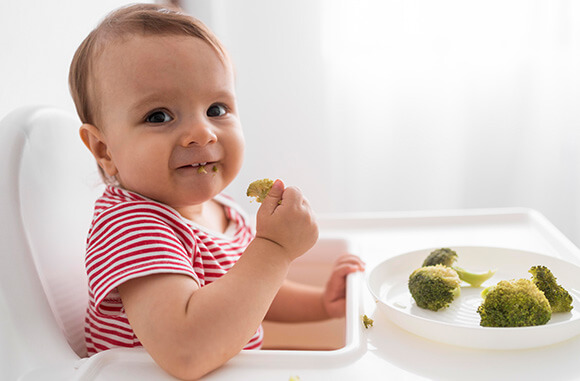
Introduction of Solid Foods to Toddlers By Dr. Peeyoosh

Rice, mashed potato, or small pieces of fruits? Are you worried about your baby's menu while introducing him or her to solid foods? Have you set a date for making him eat solid foods? Are you confused about when to make your baby eat those solid foods? Many moms get plenty of advice from family members, friends, or even relatives regarding what a baby should eat and avoid but this can only make the matters worse as everyone has a different opinion. So, it will be a tough choice for you to decide what to give your baby. But, we solve your problem as we give you a complete list of solid foods that you must include in your baby's diet plan. Read on to know more about this and get going!
Are you aware? Your baby is ready to eat those solid foods when they are about 4 months to 6-months-old. It is no brainer that your baby's digestive system wouldn't be fully developed to digest solid foods. Thus, it is essential to introduce solid foods at the right time. Not too early or not too late. Every child is different. It is essential to know whether the child is ready to have solid foods. So, looking for few signs will allow you to determine whether your child is ready. When you notice that your baby has gained good neck control, shows an interest when you are having food by looking into your plate, attempts to reach out to your food, or even tries to open mouth when you try to offer him/her food. It is a known fact that most babies will show signs of eating solid foods around 6 months. Introduce solid foods when you and your baby are relaxed.
The signs that your baby is hungry are the baby will be excited to see that the food is ready and leaning towards you when you have the plate of food. The signs your baby is not interested in include pushing the spoon away, shutting the mouth while you try to feed her/him, and turning the head away. Try to feed your baby just a spoonful of the amount and later move onto those larger portions. Instead of placing food in the front, you must try to place it on the tongue. Allow him/her to suck the food. Make sure that the foods are properly mashed, cooked, pureed, or strained with appropriate texture. Avoid feeding foods like peanuts, cashew nuts, almonds, or those foods where there is a risk of choking.
Here are some foods that are ideal for your baby
- Vegetables: You can begin withsweet potato, carrot, or even peas. Even if your baby rejects them then just try to feed them the next day. Do not easily give up on feeding your baby.
- Cereal: Opt for iron-fortified cereals.You can choose barely and oatmeal.
- Fruits: Try to make your baby eat mashed bananas or apples, pears, and even peaches. Even pureed avocado is a good option as it is creamy and jam-packed with healthy fats.
- Finger foods: These are small in size and can help your baby grip them properly. Hence, crackers, dry cereals, small pieces of scrambled eggs, and bread can be given to your babies.
- Iron-rich foods: These are essential to keep anaemia at bay.Raisins, peanut butter, and spinach can do the trick here.
Follow these tricks while preparing food for your baby
- Try to mash or puree the foods until they become smooth. Do not give your child big pieces of food. Foods should be cooked unless they become soft.
- In order to make the cereals smooth, try to mix them with formula milk.
- It is essential to cut strawberries, grapes, and tomatoes into small pieces.
- Remove the skin and bones of the fish before you cook it.
Know what to avoid: Raw fruits and vegetables,popcorn, raw eggs, large chunks of poultry,and even those raisins which are uncooked.
Caution: In case, you observe that your baby has a food allergy then avoid him/her giving those foods. Consult your doctor regarding the symptoms you observed in the baby after he/she injected certain foods.
Related Blogs

How to Treat and Prevent Brown Discharge
Read More
Endometriosis Understanding, Diagnosing, and Managing the Condition
Read More
Emotional Support During IVF Treatment
Read More
Understanding Gestational Diabetes: Insights from Dr Shruthi Kalagara
Read More
Urinary Tract Infection (UTI) in Pregnancy
Read More
Early Pregnancy Care for New Pregnant Women: Expert Advice | Motherhood Hospitals
Read More
Body Positivity Tips Post C Section (Cesarean Delivery)
Read More
Vaginoplasty: Procedure, Cost, Risks & Benefits, Recovery
Read More
The Digital Dilemma: Exploring the Medical Implications of Technology on Child Development
Read More
How To Relieve Menstrual Cramps? - 8 Simple Tips
Read MoreRequest A Call Back
Leave a Comment:
View Comments
Previous
Next
HELLO,
Stay update don our latest packages, offer, news, new launches, and more. Enter your email to subscribe to our news letter


 Toll Free Number
Toll Free Number








No comment yet, add your voice below!